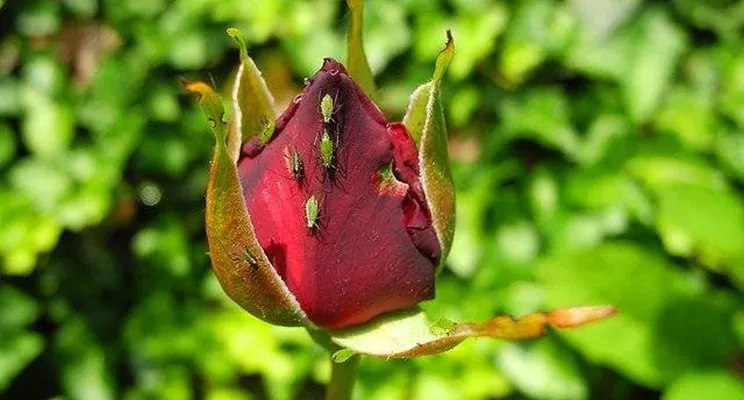Greenflies, commonly known as aphids, are frequent pests in gardens, particularly targeting rose bushes. These tiny insects feed on the sap of plants, leading to weakened growth and diminished blooms. Effectively managing greenfly infestations is crucial to maintain the health and beauty of your roses.
Understanding Greenflies
Greenflies are small, soft-bodied insects that typically appear green but can also be yellow, brown, or red. They measure about 1 to 3 millimeters in length and often cluster on the undersides of leaves and around new growth. By piercing plant tissues to extract sap, they can cause leaves to curl and distort, and flowers to become deformed. Additionally, their excretion of a sticky substance called honeydew can lead to the development of sooty mold, further harming the plant.
Identifying Greenfly Infestations
Regular inspection of your rose bushes is key to early detection of greenfly infestations. Look for:
- Clusters of insects: Check new shoots, buds, and the undersides of leaves for groups of small insects.
- Leaf distortion: Leaves that are curling, wrinkled, or yellowing may indicate greenfly activity.
- Sticky residue: The presence of honeydew on leaves or surrounding surfaces suggests an infestation.
- Sooty mold: A black, powdery fungus growing on honeydew deposits can further confirm greenfly presence.
Natural Predators: Encouraging Beneficial Insects
One of the most effective and environmentally friendly methods to control greenflies is by attracting their natural predators to your garden.
Ladybirds (Ladybugs)
Ladybirds are voracious consumers of aphids. To attract them:
- Plant nectar-rich flowers: Species like marigolds, dill, fennel, and yarrow can draw ladybirds to your garden.
- Avoid pesticides: Chemical sprays can harm ladybirds; opt for natural pest control methods to maintain their population.
Birds
Small birds, such as wrens and blue tits, feed on greenflies. To encourage them:
- Provide food sources: Install bird feeders stocked with seeds to attract these birds.
- Offer water: Bird baths can entice birds to visit and stay in your garden.
By fostering a habitat that supports these natural predators, you can reduce greenfly populations without resorting to chemicals.
Cultural Control Methods
Implementing certain gardening practices can help deter greenflies:
- Pruning: Regularly remove and destroy heavily infested stems and leaves to reduce greenfly numbers.
- Companion planting: Planting aromatic herbs like mint, chives, and garlic near roses can repel greenflies.
- Water management: Avoid over-fertilizing and over-watering, as lush growth can attract aphids.
These strategies create an environment less conducive to greenfly infestations.
DIY Remedies
Several homemade solutions can effectively control greenflies:
- Water spray: A strong jet of water can dislodge greenflies from your roses. Use caution with delicate plants to avoid damage.
- Soapy water: Mix a few drops of dish soap with water and spray onto affected areas. Test on a small section first to ensure the solution doesn’t harm the plant.
- Essential oils: Dilute essential oils like peppermint, clove, thyme, or rosemary with water and spray on infested plants.
- Vinegar solution: A mild vinegar spray can deter greenflies; however, use sparingly to prevent soil acidification.
These methods offer chemical-free alternatives for managing greenfly populations.
Chemical Control Options
If natural methods prove insufficient, chemical interventions may be necessary. Options include:
- Insecticidal soaps: These biodegradable soaps disrupt greenflies’ cell membranes, causing dehydration. Apply directly to the insects for best results.
- Horticultural oils: Oils like neem or mineral oil suffocate greenflies and can disrupt their feeding. Apply as a spray, ensuring thorough coverage.
- Botanical insecticides: Compounds such as pyrethrins, derived from plants, can be effective but may also affect beneficial insects.
- Systemic insecticides: These are absorbed by the plant and provide long-lasting control but may pose risks to pollinators.
Always follow label instructions and consider the environmental impact before using chemical treatments.
Preventing Future Infestations
To minimize the risk of greenfly returning:
- Regular monitoring: Inspect your roses frequently for early signs of infestation.
- Maintain plant health: Healthy plants are more resilient to pests. Ensure proper nutrition and care.
- Encourage biodiversity: A diverse garden attracts various beneficial insects and birds that help control pest populations.
By adopting these preventive measures, you can sustain a garden that is less susceptible to greenfly invasions.
Conclusion
Managing greenflies on roses requires a combination of vigilance, natural interventions, and, when necessary, chemical treatments. By understanding these pests and implementing integrated pest management strategies, you can protect your roses and enjoy their vibrant blooms throughout the season.
Related Topics:


